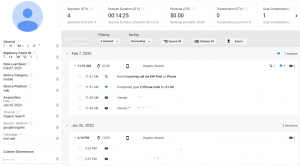Privacy is an increasingly relevant issue in the marketing industry as technology gets more advanced and workarounds for data compliance get smarter by the day. So where are we and how did we get here? Are we at the point where corporations know more about us than we do? Is Mockingbird one of those corporations?
The short answer to that last question is no, we don’t have data on millions of individuals. While we can see details about the people who visit our site, we can’t actually determine much about them from their location and device type. That is, unless there’s only one person in Billings, Montana with a Samsung Galaxy S8, in which case, hi to that one person.
Of course, privacy is a lot more complicated than that. Mockingbird specifically might not have data on individuals, but a lot of companies do. It’s easier to do targeted advertising when you know exactly who you’re targeting.
How to Know Who You Are Targeting
What Are Cookies
The most common way to figure out who to target is by cookies. Cookies are pieces of software that get downloaded onto the user’s browser or hard drive (depending on the type of cookie) and can provide information on the user’s habits. This means that cookies are used to keep things in your shopping cart when you’re browsing an online store, but it also means that Google knows a lot about you just through the websites you have visited. Google then uses that information to assist advertisers in targeting you specifically.
You might have noticed that more and more websites are giving notice to their users that they use cookies, and to continue on the site you need to accept cookies into your life. This is largely a state by state legislative change, where some states are now requiring sites to inform their users of the use of cookies, so sites often find it easier to notify all users despite their location.
Privacy protection legislation is attempting to crackdown on Cambridge Analytica level data sharing, but legislators are hardly up to the task of keeping up with developers. Sidestepping privacy legislation is almost its own branch of black hat marketing at this point, and should be avoided. Following the rules and respecting privacy is the best way to go for legal and ethical reasons.
How Do Cookies Track Users
When a user visits a site, a cookie is placed on their browser or hard drive. After they leave the site, the cookie is still there. If they return to the site, the cookie can tell the website that it’s the same user as before. If you want to see the type of information Google will provide about a single user, here’s a screenshot from Google Analytics:

As you can see the user isn’t identified, only the pages they visited and where they decided to convert. While Google will provide general information about demographics (percentage users male and female, number of users from specific locations, etc), they do not include this in user-specific info. We can see specific user paths, see which paths work best for conversions, but we can’t see how these paths relate to where the user is from or what their interests are.
Will Marketers Jump On Any Opportunity to Invade Privacy?
I mean, probably. Wherever there’s the opportunity to better sell to people, marketers will utilize it. Users are the commodity, and it forces marketers into an ethical pickle to think of their commodity as people. I would like to add a disclaimer here that Mockingbird is not interested in selling user’s data and are committed to privacy for both users and our clients. While there will always be those willing to do whatever it takes to profit, there are also those who will stand their ground for what they believe in.
This is where Google can be considered relatively…good? It’s no doubt that Google knows more about who we are as individuals than we probably do; their data runs deep. But they also try to limit the access their advertising customers have to user data. They limit how many times advertisers can market to a single person in a day, and they limit how targeted those ad campaigns can be. They have restrictions for what can be in ads, and prohibit false information. Compared to a site like Facebook, Google is amazing, but that really isn’t a very high bar.
So What Do I Tell My Paranoid Relative Who Thinks Their Microwave is Recording Them?
Well, tell them not to have private discussions in front of their microwave if they’re so worried about that. There’s plenty to be worried about when it comes to internet privacy, but the ads for shoes probably shouldn’t be top of mind.